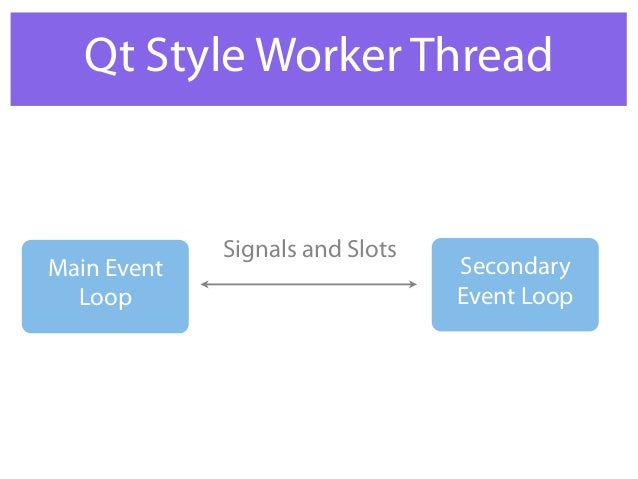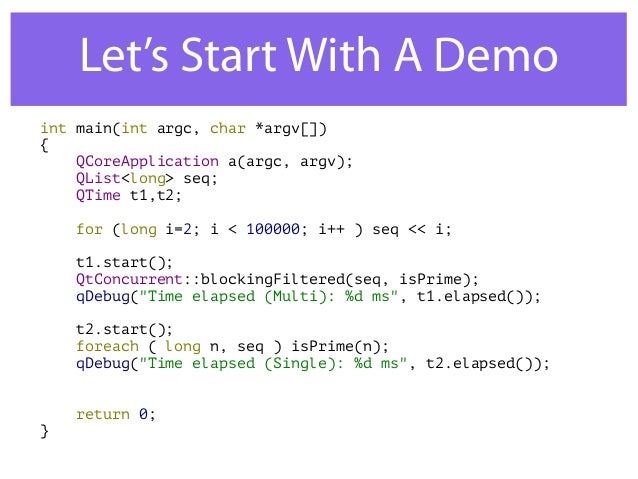Qt Signals Slots Threads
New customer offer. Place 5 x £10 or more bets to receive Qt Signals And Slots Across Threads £20 in free bets. Repeat up to 5 times to receive maximum £100 bonus. Min odds 1/2 (1.5). Qt documentation states that signals and slots can be direct, queued and auto. It also stated that if object that owns slot ‘lives’ in a thread different from object that owns signal, emitting such signal will be like posting message – signal emit will return instantly and slot method will be called in target thread’s event loop. This advice is true for both direct and queued connections. Even if the sender of the signal and the receiver of the slot are in different threads, we should still pass arguments by const reference. Qt takes care of copying the arguments, before they cross the thread boundaries – and everything is fine. I have GUI Thread which creates & manages the GUI content. Now when the application is idle i.e. All threads are idle (or even if only the GUI thread is idle) then I want my QMainWindow inherited class's object to emit a SIGNAL. So that whenever the Application is idle I will silently create the Wid. The mobile casino has taken the concept of personalized gaming Qt Signals And Slots Thread Safe to a whole new level. Qt Signals And Slots Thread Safe Now you can play on the go 24×7 regardless of where you are. All you need is a smartphone that gives you Internet access via 3G, 4G, LTE, or Wi-Fi.
- Qt Signal Slot Cross Thread
- Qt Emit Signal From Thread
- Qt Signal Slot Main Thread
- Qt Thread Communication
Qt documentation states that signals and slots can be direct, queued and auto.
It also stated that if object that owns slot ‘lives’ in a thread different from object that owns signal, emitting such signal will be like posting message – signal emit will return instantly and slot method will be called in target thread’s event loop.
Unfortunately, documentation do not specify that ‘lives’ stands for and no examples is available. I have tried the following code:
main.h:

main.cpp:
Output is:
Qt Signal Slot Cross Thread
MySlot() is never called :(. What I’m doing wrong?
There are quite a few problems with your code :

- like said by Evan the emit keyword is missing
- all your objects live in the main thread, only the code in the run methods live in other threads, which means that the MySlot slot would be called in the main thread and I’m not sure that’s what you want
- your slot will never be called since the main event loop will never been launched : your two calls to wait() will only timeout after a very long time (and you’ll probably kill your application before that happens) and I don’t think that’s what you want either, anyway they really have no use in your code.
This code would most likely work (though I have not tested it) and I think it does what you want it to do :
Now MyObject will live in thread2 (thanks to moveToThread).
MySignal should be sent from thread1 (thought I’m not sure on that one, it might be sent from main thread, it doesn’t really matter).
No event loop is needed in thread1 since emitting a signal doesn’t need an event loop. An event loop is needed in thread2 (lanched by exec()) to receive the signal.
MySlot will be called in thread2.
Do not subclass QThread for Qt 4.4+
While Aiua’s answer is good, I want to point out some issues with QThread and Qt 4.6 or 4.7.
This article sums it up: http://blog.qt.io/blog/2010/06/17/youre-doing-it-wrong/
Lack of Documentation on Qt’s part

Unfortunately the problem stems from a lack of updates to documentation. Prior to Qt 4.4 QThread had no default run() implementation, which meant that you had to subclass QThread in order to use it.
Qt Emit Signal From Thread
If you’re using Qt 4.6 or 4.7 then you almost certainly should not subclass QThread.
Qt Signal Slot Main Thread
Use moveToThread
Qt Thread Communication
The key to getting slots to execute in a worker thread is to use the moveToThread method as Aiua pointed out.
Tags: qt